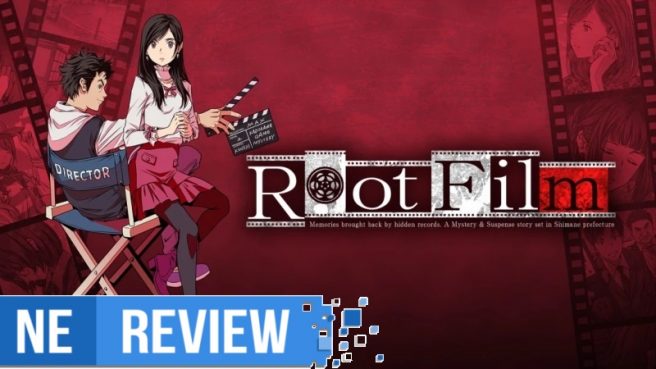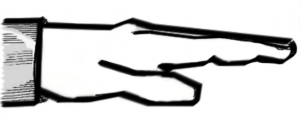[Review] Root Film
System: Switch
Release date: March 19, 2021
Developer: Kadokawa Games
Publisher: PQube
There aren’t many games out there that attempt to use the world of filmmaking and video production as a narrative backdrop. As someone who has spent his whole career working in said industry, I was excited to see Root Film – the latest visual novel from the up-and-coming Kadokawa Games, who also released Root Letter in 2016 – attempt to explore what I had hoped would be a unique spin on the murder-mystery genre. While the title attempts to craft an interesting narrative progression for this type of game, the game ultimately failed to hook me on its premise.
I feel like a visual novel thrives or dies based on the strength of its characters, setting and overall narrative – and Root Film certainly begins on a strong note. The first scene of the story is presented as a flashback to a horrible incident that results in a dead woman lying on the streets of Japan. It’s a relatively dark and dramatic introduction, and I was curious to see how the narrative would go about unraveling the mystery.
Of course, it wouldn’t be satisfying if the mystery were solved in the first chapter, so instead the player is introduced to Rintaro Yagumo, a filmmaker who runs an indie film studio in Japan’s Shimane prefecture. Yagumo and and his video editor Aine Magari have been stuck producing low-budget, low-passion horror films for years, and the duo have been looking for their next big break. An opportunity comes along to reboot a film project that was mysteriously abandoned a decade ago – but it’s a competitive project, so the team has to prove their capabilities out in the field or risk missing out on the opportunity.
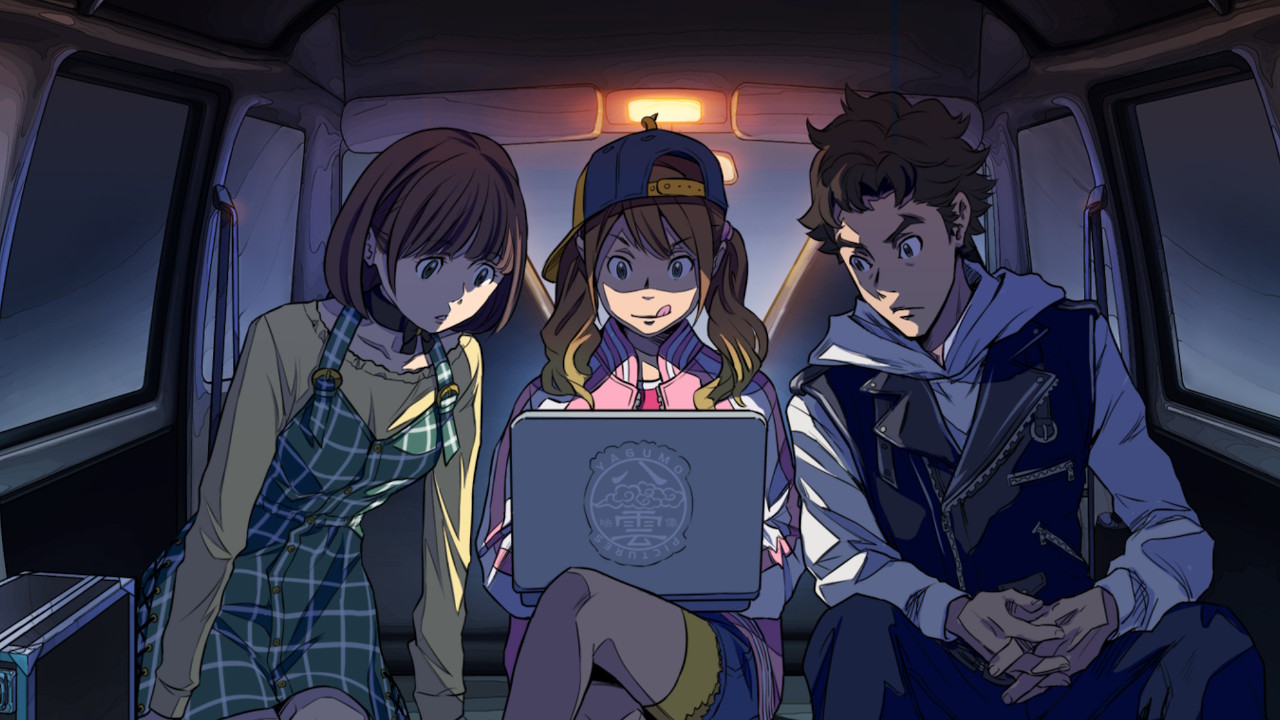
That’s really all just set-dressing for the overall narrative, which quickly evolves into a series of interconnected whodunnits that serve as the backbone for the game’s overarching mystery. Our team of moderately competent filmmakers travel across a wide swath of Japan together, camera in tow, getting sucked into solving crimes that just so happen to occur within their immediate vicinity. It’s actually a bit ridiculous the extent to which our cast of characters end up playing detective, rather than doing any actual filmmaking – it definitely will take a little more suspension of disbelief than you might be prepared for. I mean, its no wonder why this so-called “film studio” is struggling – they’re way too busy trying to be private investigators instead!
Now, when it comes to visual novels as a genre, I generally think the impetus of asking players to solve some kind of mystery is a great way to infuse some interactivity into what would otherwise be a very straightforward reading experience. Root Film definitely at least attempt this, but I feel the execution overall is a bit sloppy and unfulfilling. The game gives the player a map of Japan and a list of locations, each one containing at least a few people or objects to interact with, which gives the impression that there might be some strategy in deciding where to go next or who to talk to. In reality, though, the map is little more than a façade as there is really only one way to progress through the game’s story. There’s pretty much always only one “correct” place to go next, and its not really possible to, for example, miss talking to an important character or fail to collect a piece of evidence.
I don’t mind a linear story by any means, but learning that the map was little more than an illusion of player choice damaged my opinion of Root Film more than it helped. It wouldn’t have bothered me so much had the game done a better a job of guiding the player towards the next location required to advance the story, but that rarely happens. This means a lot of time will likely be wasted randomly clicking on locations on the map, only to get some self-aware dialogue from the game along the lines of “Why did we come back here again? I can’t remember, let’s go somewhere else!”
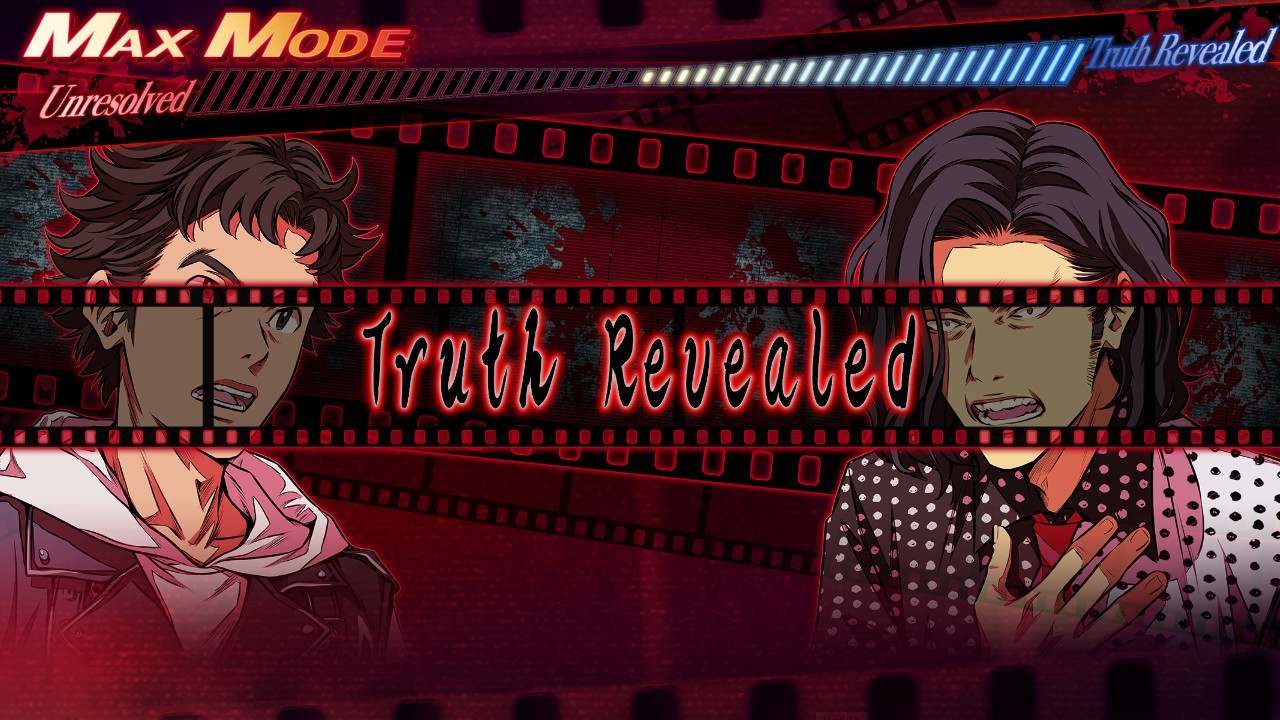
Similarly, this game structures its narrative in a flowchart, with two stories happening parallel to each other at a certain point in the game – and at a certain point the player can choose which narrative they would like to advance. The word “flowchart” may evoke memories of the branching, layered plot of something like Nine Hours, Nine Persons, Nine Doors, but it really is nothing more than a chapter selection screen. Again, that’s not inherently a bad thing, as I do enjoy a straightforward story, but it’s the false illusion that there’s more happening behind-the-scenes that just rubbed me the wrong way.
All of this culminates in a plot that, somehow, still manages to spend too much time meandering for its own good. Sure, a good mystery takes time to build into a satisfying conclusion, but that flashback scene I addressed at the beginning of the game isn’t even alluded to, much less mentioned, until the back half of the game. You’ll spend a lot of time “solving” what feel like standalone mysteries, and wondering how any of this is even related to what the game told you was going to be the focus at the beginning. Yes, the pieces do eventually start to fit together, but by the time they do, I was struggling to remain interested in the story. The story really would have benefitted from a faster pace and bit more actual sleuthing.
Probably where I felt most like an actual detective was in the game’s Synesthesia sequences. These are infrequent moments in the game’s plot where Yagumo is cross-examining a suspect to try and glean the truth from them. By the time you reach one of these sequences, Yagumo will have collected a variety of evidence related to the case, and gameplay here consists of presenting that evidence in the right order. There’s a “truth meter” at the top of the screen in these segments that goes up or down with each correct or incorrect assertion that you try to make. The whole mechanic is likely to evoke a bit of Ace Attorney in players familiar with the genre, but unlike in that series, there really is very little depth to Synesthesia sequences in Root Film. Even if you’ve only barely been paying attention to the mystery unfolding in front of you, you’ll likely have no issues selecting the correct dialogue responses the first time through – partially because the mysteries themselves don’t have a large amount of evidence to consider in the first place. This, to me, feels like just another area in which Root Film approaches doing something interesting but falls short of achieving that goal.
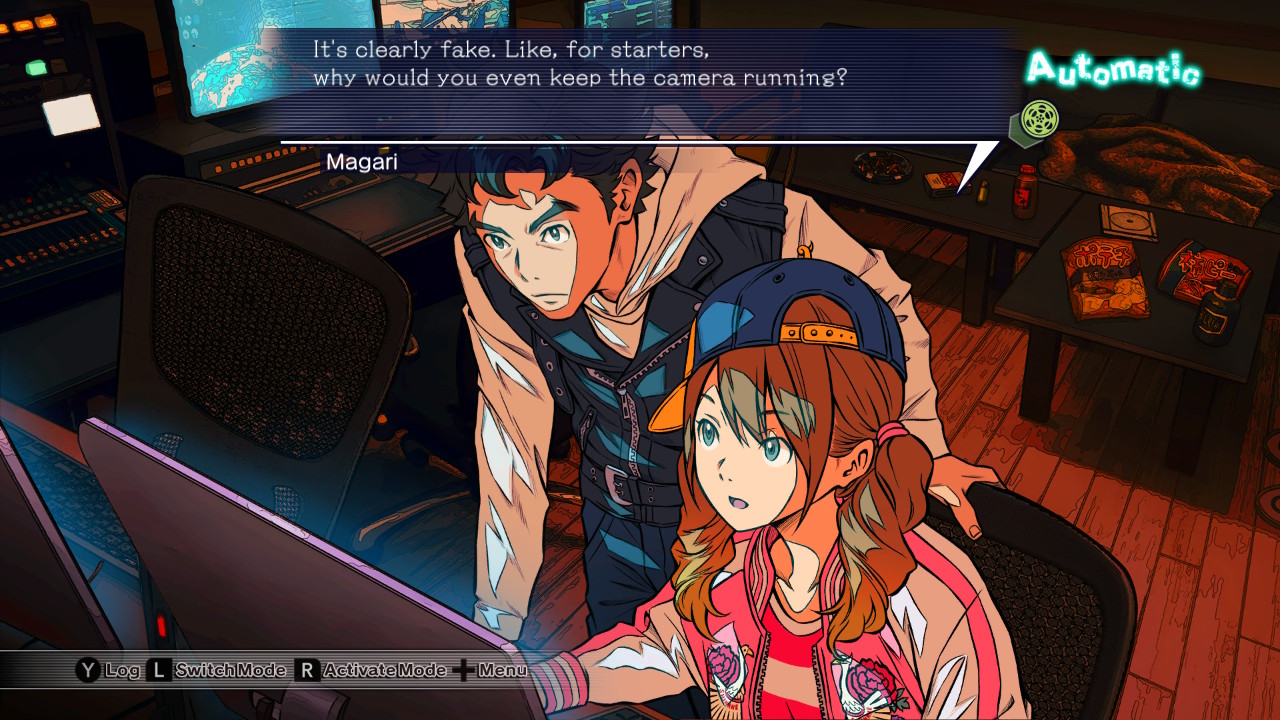
If it seems like I’m being a bit hard on this game, I am – and that’s because visual novels are quickly becoming a more saturated market here in the West, and plenty of titles have already figured out how to avoid these types of pitfalls. But one thing Root Film gets right is its characters.
I always appreciate when a Japanese game tries to avoid leaning hard on the over-the-top, highly dramatic clichés that perpetuate many visual novels. Root Film does a good job at making its characters feel like real people, which is really important to grounding the mystery in reality. Yagumo may fall into the “gruff and jaded detective” role, but his earnestness as a creative person and his ambition to achieve more with his career are instantly relatable. Magari may be a plucky, happy-go-lucky anime girl, but she’s also self-confident and level-headed, perhaps moreso than any of the other characters. There’s also a whole other character with her own narrative arc that I don’t want to say too much about, but know that she and all of Root Film’s side characters have that same level of humanity to them that can be genuinely tricky to pull off.
They’re well-drawn characters, too. I’m not normally a huge fan of this kind of art style with its heavy-bordering and somewhat flat appearance, but I think it’s well-executed here. The game’s environments can be a bit more hit-and-miss – some of the interior areas have a nice amount of detail, but the exterior environments felt a bit bland to me. On the whole I would have liked to see a bit more motion to both the characters and environments, as it would have helped make the world feel a bit more lived-in.
The music, for the most part, left me feeling underwhelmed. The game’s main theme is great, and every time I hear it it makes me feel like I’m on the verge of experiencing an epic mystery. But most of the music in the game lacks that same oomph. Most of what you’ll hear most frequently is pretty generic, and sometimes borders on tonally inappropriate – nothing quite breaks the immersion like hearing an upbeat, sunny song after just witnessing a murder. But there are a few tracks that are a bit jazzier or low-key, and fit the detective vibe a bit better.
The Verdict
Root Film is a serviceable if ultimately unremarkable visual novel. While its characters and overall presentation are strong, the core mystery of the game takes too long to ramp up and the illusion of choice that fuels the entire structure of the game ends up making the experience feel more bloated than it should. Kadakawa Games has done an admirable job at trying to replicate the successes of their first visual novel, but ultimately there is very little here from both gameplay and story perspectives that hasn’t been done better in other visual novels. Still, fans of a solid mystery story might find something here to enjoy.
Review copy provided by the publisher for the purposes of this review.
